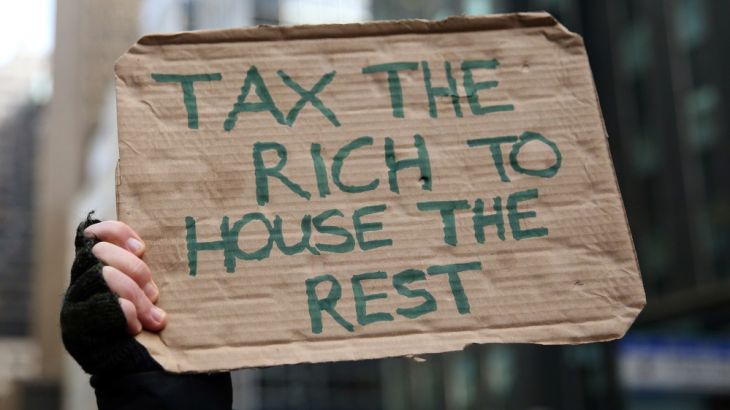
The Great Inequality Debate
Economist Arthur Laffer and author Anand Giridharadas discuss inequality, billionaires and oligarchy in the US.
The US economy. It is one of President Donald Trump‘s pet topics, he loves to talk about it, he loves to brag about it, and he loves to tweet about it.
Just this week the US president took to Twitter to tell the world that more than 5 million jobs had been created since he took office. He also boasted that unemployment has hit 3.6 percent; “the lowest since 1969”.
Keep reading
list of 4 items‘We need you’: Solomon Islands’ support for US agency’s return revealed
Why are nations racing to buy weapons?
Parallel economy: How Russia is defying the West’s boycott
According to Trump the US economy is the “best it’s ever been”. But who’s benefitting from this apparent “economic boom”, everyone? Or just the rich?
According to the Institute for Policy Studies’ Inequality.org, income disparities are growing.
They have become so pronounced that the top 10 percent of Americans now make more than nine times as much as the bottom 90 percent.
Anand Giridharadas, author of Winners Take All: The Elite Charade of Changing the World believes the US has hit an inequality crisis point.
“You start to see people who run a company like Amazon, own a company like Amazon become the richest person in the world, while workers at Amazon are peeing in a bottle because the company doesn’t give them enough break time in the relentless drive for productivity, ” Giridharadas said.
“The people down below are not down below because they happen to be down below, they’re down below because someone is actually standing on their back,” he added.
Economist Arthur Laffer, a former adviser to President Trump, admits inequality exists, but says the gap between rich and poor is not the problem, he says it is income that matters.
“I’ve never known a society that doesn’t have large income gaps. It’s been with us for centuries … but the truth of the matter is income does get you better healthcare, income does get you more job satisfaction … that’s why I want to see the poor get more income,” Laffer said.
Giridharadas argues that while the US has seen a period of economic growth, the benefits of that growth have been captured by the rich.
He believes social mobility has ground to a halt, and says that is partly due to the economic policies of former US President Ronald Reagan.
“Corporate profits have gone up … the income of affluent people has gone up, and wages have stagnated,” Giridharadas points out.
Laffer, who was an economic adviser to President Reagan, says Reagan’s policies, including broad-based tax cuts, were positive for everyone because they stimulated growth and created 20 million jobs.
“It created an explosion of growth in income, jobs for the poor, the minorities, the disenfranchised,” Laffer said.
The poor may be getting jobs, but who holds the power in the US?
Democratic Senator Bernie Sanders, who has announced his bid to be the Democratic presidential candidate in 2020 says the US is facing unprecedented income and wealth inequality. He says the US has become an oligarchy, and Gridharadas agrees.
“I think we do live in a functional oligarchy, and I think that’s something Americans need to understand,” he said.
Laffer admits the rich do have influence in the US, but stopped short of describing the country as an oligarchy.
He argues the way to limit the power of the rich is not through tax hikes, but tax cuts, “low-rate, broad-based tax cuts,” Laffer argues.
Giridharadas is adamant that type of thinking belongs in the 1980s.
Most Americans feel that “society doesn’t work for them anymore … there’s a tremendous new consensus emerging that we need new economic thinking,” he added.
On this week’s UpFront special we debate inequality, the rich and oligarchy in the US.
Follow UpFront on Twitter @AJUpFront and Facebook.